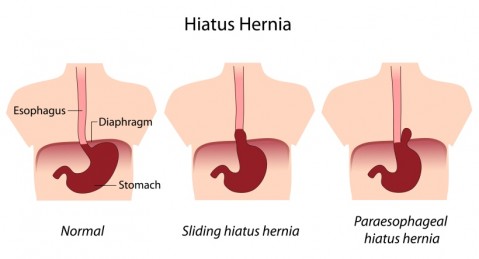DrCarney.com Blog
Is GERD a Symptom of a Hiatal Hernia?
Half of the adults living in America who consume the rich Western diet have permanently stretched the diaphragm that separates the abdominal cavity from the thoracic cavity. Many patients are unaware that they have stretched their diaphragm; some experience symtoms when others do not. This condition is commonly seen in adults over the age of 50, smokers, and those who are overweight, although it can develop in people of all ages and is not a result of the natural aging process. Years of excessive straining and bearing down to move difficult bowel movements creates tremendous pressure within the abdominal cavity. With each and every desperate push, pressure forces the top part of the stomach up into the thoracic cavity where the esophagus passes through diaphragm creating what is referred to as a hiatal (or hiatus) hernia. At some point, the top part of the stomach will eventually end up resting on top of the diaphragm. As a result, the lower esophageal sphincter which closes the opening between the esophagus and stomach fails to work properly. Breathing creates negative pressure as the lungs expand. This draws stomach acid up into the esophagus, mouth and lungs where it can erode the lining of the esophagus, cause sinusitis, loss of dental enamel, and asthma. This condition is known as gastroesophageal reflux disease (GERD) and is the most common symptom in those with a hiatal hernia, although not everyone who suffers from GERD has injured their diaphragm.
As mentioned above, those who are overweight and suffer from chronic constipation are at risk of developing a hiatal hernia; both of which are caused by eating the rich Western diet based on meat, dairy, eggs, refined oils, and fried and processed foods. Simply by eliminating the injurious foods and replacing them with whole grains, beans, vegetables, fruits and some nuts/seeds, weight issues are resolved and constipation is relieved due to the high fiber content in whole plant foods. Other factors which contribute to GERD are overeating, medications, and consuming chocolate, peppermint, onions, coffee, decaffeinated coffee, fruit juices, hot peppers, Mexican salsa sauces, large fatty meals, mints, and alcohol. For some people, raw vegetables (instead of cooked) like onions, green peppers, cucumbers and radishes can also be troublesome.
In addition to changing to a diet based on whole, natural plant foods, and avoiding those foods which exacerbate acid reflux, raising the head of the bed by 4-6 inches prevents stomach acid from flowing up the esophagus at night. Furthermore, avoid eating a meal high in protein before bedtime which stimulates the stomach to produce more acid. If you suffer from GERD, you will see dramatic results after removing the acid-producing animal products from your diet and adopting a low-fat, high-fiber, oil-free, starch-based, plant food diet.
Many patients begin to notice improvements within days or weeks when following this treatment plan. Some patients may benefit from taking an antacid temporarily in order to give the esphogus a chance to heal. Unfortunately, the hernia can never be resolved on its own, however focusing on treating the cause of gastric reflux reduces the likelihood of further complications. As a last resort, a surgical procedure can move the stomach back into the abdominal cavity to repair the hernia, but this should be reserved for only those who have not been able to experience relief from the methods stated above. If you're interested in seeing how the rich Western diet promotes developing a hiatal hernia and GERD, you will enjoy watching Dr. John McDougall's video, Intestines From the Beginning, and Dr. Michael Klaper's Digestion Made Easy: Journey thru Your Amazing Digestive System. Additionally, information regarding the pros and cons of taking antacids are explained in detail in the article, Gastroesophageal Reflux Disease – Overview and Treatment Options, written by Dustin Rudolph, PharmD.
You may also like:
(1) Diet and Hiatal Hernia (video)
(2) Help, My Stomach is on Fire and I Can't Put it Out
(3) Say Goodbye to Acid Reflux
(5) What is Diverticulosis and What Causes it?
(6) Long Term Use of GERD Meds are Unsafe
(8) Hiatus Hernia
(9) Straining for Relief – Damage Everywhere
(10) Dr. McDougall's Digestive Tune Up
(11) Using Diet to Prevent Colon Polyps
John McDougall MD Links
Michael Klaper, MD Links
Preview the "Ask the Doc!" Trailer
Your Questions Answered: In Dr. Carney's Starch-Smart® System seminars, written questions from participants are collected beforehand, protecting their privacy. In this informative video presentation, Dr. Carney shares the answer to many of those frequently asked questions - with complex scientific evidence made easy to understand. Learn the answers to what you've always wanted to ask, and so much more!
When you subscribe to the blog, we will send you an e-mail when there are new updates on the site so you wouldn't miss them.




